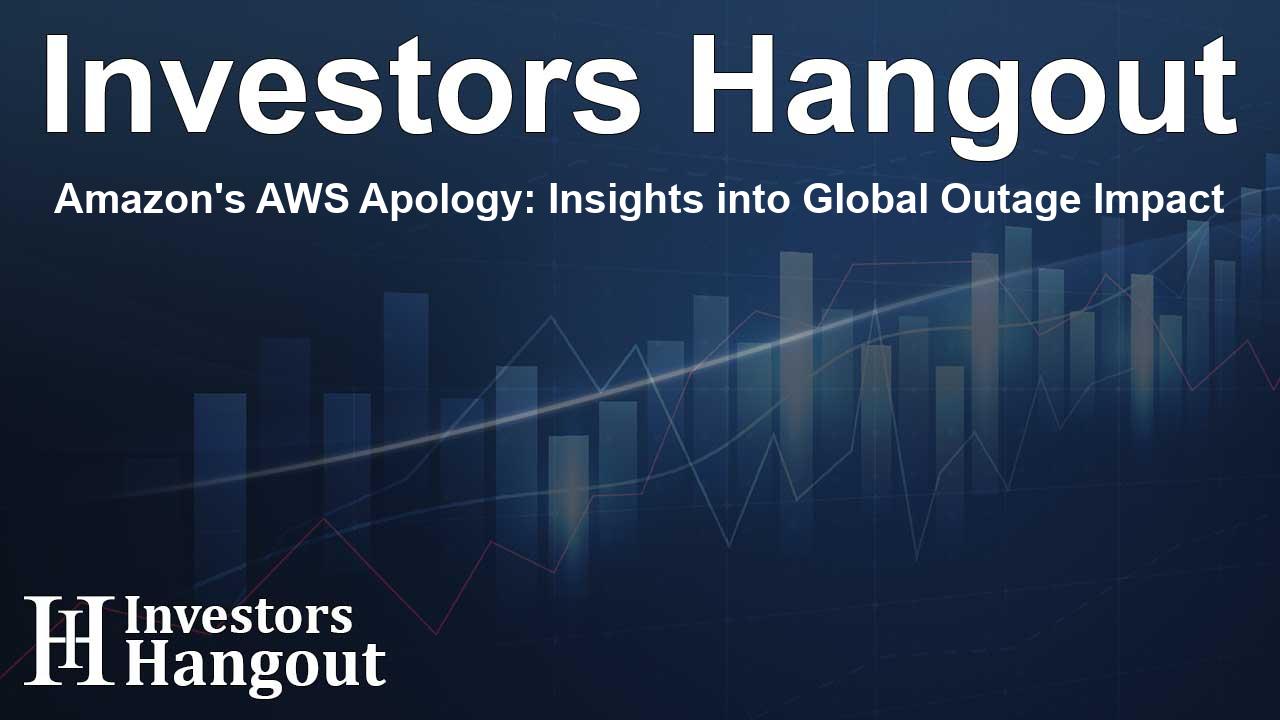Amazon's AWS Apology: Insights into Global Outage Impact

Amazon's AWS Issues Apology After Outage
Amazon.com Inc.’s (NASDAQ: AMZN) cloud computing service, AWS, has issued an apology to its users and provided an explanation for a significant outage that affected numerous major websites and services. This incident struck on a recent Monday, leading to disruptions for over 1,000 platforms relying on AWS infrastructure.
Impact of the Outage on Popular Services
The outage had an extensive impact on several well-known services, including Snapchat (NYSE: SNAP), Disney+ (NYSE: DIS), Reddit (NYSE: RDDT), and Lloyds Bank (NYSE: LYG). Many users of these platforms faced considerable inconveniences, revealing the interconnected nature of digital services today.
AWS's Technical Explanation
AWS explained that this disruption stemmed from a cascading failure caused by a rare software bug present in one of the essential systems within its infrastructure. The glitch was particularly concentrated in the Northern Virginia region, where the US-EAST-1, AWS’s largest data center cluster, is located.
The company acknowledged in their statement, "We apologize for the impact this event caused our customers…We know this event impacted many customers in significant ways.” This admission underscores the severe effects of the outage on various businesses and their operations.
Understanding the Automation Failure
According to the company, a “faulty automation” within their internal systems was responsible for the failure. It involved two independent programs that began conflicting with each other while attempting to update records, which ultimately caused critical network entries for the DynamoDB database service to be erased. This chain reaction led to a temporary breakdown of many other AWS tools and services.
Recovery and Future Improvements
While many platforms like Roblox (NYSE: RBLX) were restored within hours, others, such as Lloyds Bank and the payment app Venmo, suffered from prolonged downtime. AWS assured its customers that they are dedicated to learning from this incident to enhance their service availability and robustness in the future.
To prevent similar issues, AWS stated that the flawed automation has now been disabled globally and will be thoroughly fixed before going back online. This proactive measure aims to enhance system resilience and minimize the likelihood of future outages.
Broader Implications for Big Tech
This incident has sparked significant discussions regarding the concentration of power within Big Tech companies and the potential risks associated with relying heavily on a single service provider for such vast portions of the internet. The incident raised critical considerations about the need for alternative solutions in digital infrastructures.
In response to the outage, discussions emerged involving key figures in the political sphere. For example, Senator Elizabeth Warren (D-Mass.) highlighted the need for rethinking the structure of Big Tech companies, expressing concerns over the implications of a single entity's failure impacting a massive part of the online ecosystem. This outcry has reignited debates about regulatory measures and the potential need for breaking up tech giants to maintain competitive balance in the market.
Elon Musk's Response to the Outage
In a related development, entrepreneur Elon Musk commented that X (formerly Twitter) operates independently of AWS and does not depend on its infrastructure. This statement signals a strategic direction towards robustness and independence from outages that may affect other tech platforms.
Conclusion
Amazon has maintained a strong position in the market, currently holding a momentum rating of 65.94% and a growth rating of 92.76%. This dynamic indicates significant potential for recovery and growth in light of recent challenges. Businesses and customers alike are eager to see how AWS will adapt and elevate its systems post-outage, ensuring greater reliability moving forward. The event serves as a critical reminder of the interconnected nature of our digital services and the importance of system integrity in a cloud-dependent world.
Frequently Asked Questions
What caused the AWS outage?
The AWS outage was triggered by a rare software bug that affected key internal systems, specifically due to faulty automation in record updates.
How many websites were affected by the outage?
Over 1,000 websites and services were disrupted during the AWS outage.
What measures is AWS taking to prevent future outages?
AWS has turned off the problematic automation and will fix the bug before reactivating it, aiming to improve overall system reliability.
What implications does this have for Big Tech?
The incident raised concerns about the concentration of power in Big Tech and the risks of relying on a single cloud provider for critical services.
How have businesses reacted to the outage?
Many businesses expressed frustration due to significant disruptions, prompting discussions about the need for alternative solutions and possible regulatory action.
About The Author
Contact Dominic Sanders privately here. Or send an email with ATTN: Dominic Sanders as the subject to contact@investorshangout.com.
About Investors Hangout
Investors Hangout is a leading online stock forum for financial discussion and learning, offering a wide range of free tools and resources. It draws in traders of all levels, who exchange market knowledge, investigate trading tactics, and keep an eye on industry developments in real time. Featuring financial articles, stock message boards, quotes, charts, company profiles, and live news updates. Through cooperative learning and a wealth of informational resources, it helps users from novices creating their first portfolios to experts honing their techniques. Join Investors Hangout today: https://investorshangout.com/
The content of this article is based on factual, publicly available information and does not represent legal, financial, or investment advice. Investors Hangout does not offer financial advice, and the author is not a licensed financial advisor. Consult a qualified advisor before making any financial or investment decisions based on this article. This article should not be considered advice to purchase, sell, or hold any securities or other investments. If any of the material provided here is inaccurate, please contact us for corrections.
